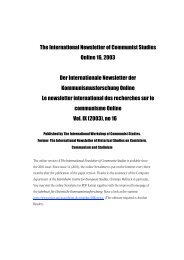Vol. XIII (2007), no 20 - The International Newsletter of Communist ...
Vol. XIII (2007), no 20 - The International Newsletter of Communist ...
Vol. XIII (2007), no 20 - The International Newsletter of Communist ...
Sie wollen auch ein ePaper? Erhöhen Sie die Reichweite Ihrer Titel.
YUMPU macht aus Druck-PDFs automatisch weboptimierte ePaper, die Google liebt.
<strong>The</strong> <strong>International</strong> Newletter <strong>of</strong> <strong>Communist</strong> Studies Online <strong>XIII</strong> (<strong><strong>20</strong>07</strong>), <strong>no</strong> <strong>20</strong> 105<br />
Fredrik Petersson, Åbo:<br />
<strong>The</strong> League against Imperialism: <strong>The</strong> Most Valuable Organizational Tool for<br />
Bolshevik Propaganda in the “Imperialist” and Colonial World during the<br />
Interwar Era? Sy<strong>no</strong>psis <strong>of</strong> a doctoral thesis.<br />
On the 21 <strong>of</strong> February 1927, German <strong>Communist</strong> Willi Münzenberg, main man in charge <strong>of</strong><br />
constructing different front organizations and other propaganda ma<strong>no</strong>euvres within the<br />
<strong>Communist</strong> <strong>International</strong> (Comintern) organisational apparatus in Europe, 158 sent the<br />
Secretariat <strong>of</strong> the Executive Committee (ECCI) in Moscow a letter, informing on the<br />
unexpected success <strong>of</strong> the “First <strong>International</strong> Congress in Support <strong>of</strong> the Oppressed Peoples<br />
in the Colonies” in Brussels, Belgium (10-15/2-1927). Münzenberg claimed that it was <strong>no</strong>w<br />
only a matter <strong>of</strong> creating a large organization and for it to remain “steady in our [Comintern]<br />
hands”. 159 <strong>The</strong> item to remain “steady” was the League against Imperialism and for National<br />
Independence (LAI). Two and half years later, in the aftermath <strong>of</strong> the Second <strong>International</strong><br />
LAI Congress in Frankfurt am Main, Germany <strong>20</strong>-31/7-1929, the situation looked somewhat<br />
different, leaving <strong>no</strong> traces <strong>of</strong> enthusiasm. <strong>The</strong> Eastern Secretariat <strong>of</strong> the ECCI concluded that<br />
the Congress “did <strong>no</strong>t reflect a historical fact <strong>of</strong> world importance and failed to give it a<br />
definite organisational form”. 160 A point <strong>of</strong> view Münzenberg at first did <strong>no</strong>t share, on the<br />
contrary, he argued that the Congress was a “powerful demonstration” against the imperialist<br />
system and in support <strong>of</strong> the Soviet Union. A considerable organisational improvement was in<br />
fact evident. 161 A state <strong>of</strong> permanent conflict and tension in the network between<br />
Münzenberg, LAI’s <strong>International</strong> Secretariat in Berlin, and Comintern headquarters in Moscow<br />
was a common feature, as it has turned out, throughout its existence.<br />
LAI has been constructed and controlled under communist influence during the years 1927-<br />
1933. After the Reichstag fire in Berlin 27 <strong>of</strong> February 1933 the entire anti-imperialist network<br />
was shredded to pieces, and as a consequence, proved too difficult to mend by its chief<br />
architect Münzenberg. Reginald Bridgeman, English Socialist and Secretary <strong>of</strong> the English<br />
Section <strong>of</strong> the LAI received authority from Moscow to run the League. 162 Hence, the<br />
158<br />
For Willi Münzenberg see Babette Gross, Willi Münzenberg. Eine politische Biographie Mit einem<br />
Vorwort von Arthur Koestler, Stuttgart, 1967, a work that still can be regarded as the most informative<br />
source on Münzenberg’s life. See also Hermann Weber & Andreas Herbst, Deutsche Kommunisten –<br />
Biographisches Handbuch 1918 bis 1945, Berlin, <strong>20</strong>04, pp. 521-522. A<strong>no</strong>ther recommendable personal<br />
account is Babette Gross' sister Margarete Buber-Neumann. See: Von Potsdam nach Moskau – Stationen<br />
eines Irrweges (Stuttgart, 1957) and Kriegsschauplätze der Weltrevolution. Ein Bericht aus der Praxis<br />
der Komintern 1919-1943 (Stuttgart, 1967).<br />
159<br />
RGASPI 542/1/7, pp. 1<strong>20</strong>-123, Letter from Münzenberg in Berlin to ECCI Secretariat in Moscow, 21/2-<br />
1927<br />
160<br />
RGASPI 495/<strong>20</strong>/722, pp. 100-105, Draft resolution on results <strong>of</strong> the II World Congress <strong>of</strong> the LAI and<br />
its direct immediate tasks (Passed by the Eastern Secretariat), 27/8-1929.<br />
161<br />
RGASPI 542/1/30, pp. 82-84, Letter from Willi Münzenberg to “Sch” [Wi/Sch.], Berlin 12/8-1929.<br />
162<br />
RGASPI 542/1/59, p. 45, Letter from Münzenberg in Paris to Ludwig in Moscow, 8/6-1933; RGASPI<br />
542/1/58, pp.31-33, Instructions to R. Bridgeman from unk<strong>no</strong>wn author in Moscow, 15/9-1933.














